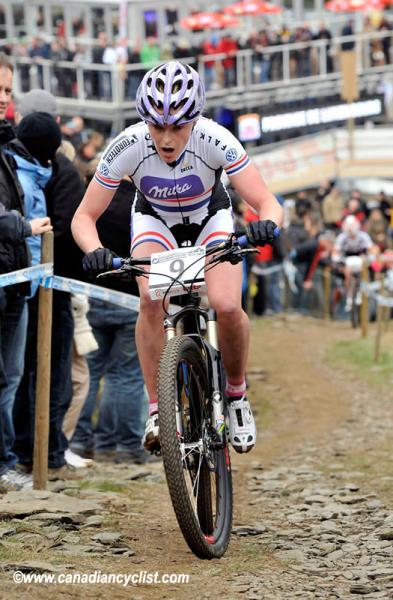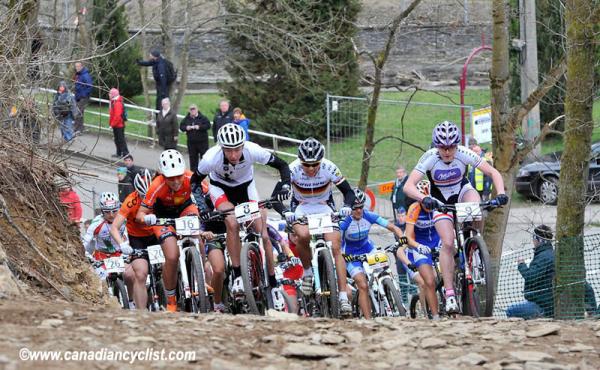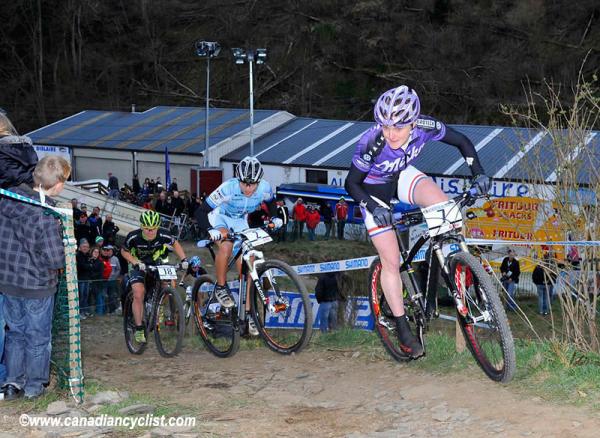Video: Last enjoys new World Cup eliminator format
British racer wins first-ever race of new discipline



Annie Last (Milka-Brentjens) became the first-ever winner of a UCI World Cup race in the brand new eliminator discipline last weekend in Houffalize, Belgium.
The talented, young British mountain biker is excited about the new discipline. "It went great for me. I think it's a good event," Last told Cyclingnews. "It's a good addition to the World Cup. I enjoy that kind of race and how it's run. It's a good atmosphere with tight corners, shorter races, elbow-to-elbow racing is fun."
Last season, some of the World Cup rounds featured eliminators as the UCI honed the format, but none were officially World Cups. Three rounds comprise this year's eliminator World Cup.
"Doing those non-World Cup eliminators last year gave me confidence because I did well," said Last. "I have quite a good sprint. You never really know though for any kind of race until you do the World Cup."
The eliminator format is similar to four cross, but it is not all downhill. Riders perform a time trial to get seated and then move through heats of four. In each heat, the top two riders advance to the next round.
The shortness of the format, relative to regular cross country racing, makes it a very different event and offers the chance for other types of riders to excel on their mountain bikes at a World Cup level. Brian Lopes, a former downhill and four cross elite racer, proved this by winning the men's eliminator in Houffalize.
"Because the eliminator is so much shorter, it means that the racing very tight. It's all about which line you take into the corners. You could go into a corner first and not come out first," said Last. "It's a minute and a half of full on, flat out racing. It's very tactical. it's a flat out sprint. You get a lot of adrenaline out of it. It's short and then onto the next one."
Get The Leadout Newsletter
The latest race content, interviews, features, reviews and expert buying guides, direct to your inbox!
Last had carefully planned her strategy in Houffalize, and it paid off. "I hit the time trial (for qualifying) as hard as possible because it makes the next few races easier. Also if you got a good start, the rest of the race was easier because of how the course was. You could hold your line and block a bit on the downhills toward the end. Getting to the top of the hill first was important and then to protect myself after that."
The Houffalize course was particularly steep - both up and down - while some others have been much flatter. Some have involved more or less dirt and also included urban landscape features such as stairs and curbs.
Being so young, the discipline is still evolving. "I think it will keep on developing as they have more and they see what works and what doesn't. Some tracks work better than others. I think they are still finding out which work best. You need to have a few different line options for overtaking. You need to have easier lines with risks to get overtaken by others to take a harder line. The thing with mountain bike cross country is that riders have to be able to do everything to do well at all races. They can't be one type of bike rider.
"The Houffalize course looked really steep when I watched the replay on TV afterward," said Last. "I think all the courses are really different and it gives a different sort of racing. That's what cross country racing is all about. I like all around courses with some technical and some power sections. I like when the course has a mixture."
Last worked her way steadily through the heats and into the final. She looked good coming into the last downhill of the final, but crashed when Eva Lechner tried to pass on the inside line of one of the corners. Both riders went down, but Last bounced back up more quickly and resumed her spot in front to take the final win. She was unfazed by the crash and said she was fine afterward.
Because the World Cup eliminators are happening prior to the cross country races, many of the top cross country racers elect to sit out the eliminator and save their legs for the more prestigious race, especially in an Olympic year. Last admits it is a challenge to balance the recovery when racing both disciplines.
"Because Houffalize was so steep with two hills and requiring so much power and effort, it did take a lot of out you," she said. "When you do your warm-up, you do quite a few laps. Then you have all the heats. It's a lot of effort in total. It's tough to recover for Sunday."
"However, if your preparation is right going into it, it is possible to race on Friday and race on Sunday with minimal fatigue effects. It does depend on the course though. Houffalize was harder to recover from ... more so than the flatter courses."
She said having the eliminator on a Friday is much better than having it on a Saturday when the cross country race is on Sunday morning. "Having a day in between makes it easier. It makes it more feasible to do both."
Last will race the other two World Cup eliminators in Nove Mesto, Czech Republic and La Bresse, France. Both are in May. She will also race the first ever world championship eliminator in Austria in September. At Worlds, the eliminator will happen after the cross country, and given that the championships are after the Olympic Games, stronger participation is expected from top cross country racers.
In one video below, Last talks about her Houffalize victory, and in the other Chris Boardman gives a tour of Annie Last's Boardman mountain bike.
Sue George is an editor at Cyclingnews. She coordinates all of the site's mountain bike race coverage and assists with the road, 'cross and track coverage.